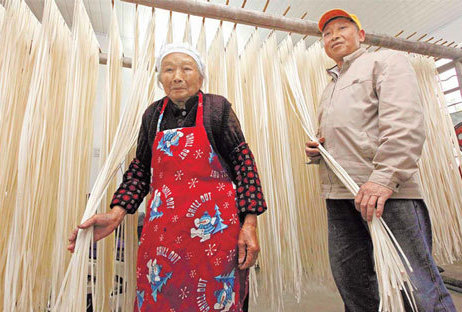Highlights
Gaining a foothold
By Shi Yingying (China Daily)
Updated: 2010-06-21 07:57
 |
Large Medium Small |
|
|
Curtains of white noodles hang on a machine, waiting to be dried in the small factory named "Three Gorges Noodles", on the first floor of 53-year-old Li Yuquan's two-story house.
Li, his wife, mother and three children were among 1,500 people resettled on Shanghai's Chongming Island from the Three Gorges area in 2000, 2001, 2002 and 2004.
The family left their home in Yunyang county (previously in Sichuan province but now part of Chongqing after the municipality was set up in 1997) for China's third largest island nine years ago to make way for the world's biggest hydropower project.
"After seeing my old home being pulled down and waving goodbye to relatives, we found ourselves in this completely new environment," Li recalls.
A total of 160,000 reservoir area residents have been resettled in other parts of the country, and are known as the "Three Gorges migrants".
"They speak a different language, eat different food and have different customs, they are obviously different from Shanghai's Chongming villagers," says Zhang Yuejin of the Shanghai coordination office of Three Gorges migrants.
Shanghai is now home to 7,519 people from 1,830 migrant families, who are scattered in districts such as Songjiang, Nanhui, Jiading, Fengxian, Chongming and Qingpu. Among them, the 1,267-sq-km Chongming Island has the greatest numbers.
Up to six families were sent to each location, which is designed to help them fit into the new environment quickly, Zhang says.
His colleague Ji Peijun says each migrant has been given 0.44 hectares of land by the Chongming government along with a 600-yuan ($87.8) monthly grant that will be continued until 2026. Ji says there are also other kinds of compensation in place, with some counties offering 5,000 yuan to any migrant child who is enrolled in university.
But reorientation has not been easy. Li says he often felt like a fish out of water in the beginning. The situation is worse for his 92-year-old mother Zhong Chaorong.
"My first and biggest barrier is the language. While most young people can speak Mandarin, those close to my age can't," says Li with a strong Sichuan accent. "As for my mother, she can barely communicate with anyone."
Li's mother missed her hometown so much that she moved back to stay with her sisters for the first two years (2001 and 2002). "Since then, she has been living partly here and partly there," Li says.
Li also took his mother back in 2008, but picked the wrong date. "That day was May 12. Just 10 minutes after we sat down and talked about the old days at my aunt's place, the ground began to shake. I carried my mom on my back and ran."
Li's oldest daughter, Li Lin, married a Shanghainese who works at Baosteel, the biggest steel company in Shanghai, and moved to the city two years ago. After studying in a community college in Shanghai, she now works at the Construction Bank of China earning a monthly salary of 3,000 yuan.
The rest of the family still lives in the two-story house the local government built before they arrived. Li says he is getting used to the sweet Shanghai cuisine and can no longer eat too much of the spicy food that is typical of his hometown.
Besides food, he also misses the tightly knit neighborhood of his hometown. "Chongming people tend to focus more on their own business," he says.

The limited socializing has affected his business. "My noodle business isn't as good as it used to be in Sichuan, where people just love noodles," says Li, who also works part-time in a local factory, besides being a long-distance driver.
He and his wife now make a living by cleaning the small rivers around the village, which brings a monthly income of 1,000 yuan each. The noodles that Li makes in his spare time bring in another 50 yuan every day.
Some of Li's relatives from his hometown have come and stayed with him, looking for better opportunities in part-time jobs in Shanghai. This is common among Three Gorges migrants, according to Zhang.
"Chinese have this tradition of going and seeking refuge with rich relatives. By coming here, they save on rent and it's next to Shanghai," Zhang says.
At the other end of Chongming Island, Zhou Shiju seems to be doing better. Zhou was one of the first Three Gorges migrants arriving in Chongming on Aug 17, 2000. Her small shop called "Three Gorges Tailor" in Miaoxi village is making quite a name for itself.
"I was doing retail business in my hometown but didn't think that would work here - I didn't know anyone in Chongming," says Zhou, 47. "The day I arrived, I noticed the local tailor didn't seem to be doing good business, and I wanted to give it a try."
Zhou proved to be very good and in just a few months, she had learned enough to open a tailor's shop of less than 10 square meters at her new home.
"I don't lower prices to attract customers. On the contrary, I charge 10 to 20 yuan more for special designs," Zhou says with pride. "I've also hired a local woman to help me as the business is getting busier. We're like sisters."
Zhou's 25-year-old daughter Chen Xiaohong was 15 when the family came to Chongming. Throughout her high school years, the girl remained reticent.
"But now, if people ask me where I'm from, I tell them Chongming instead of Sichuan," says Chen, who works in a local company besides helping out at her mother's tailoring business.

